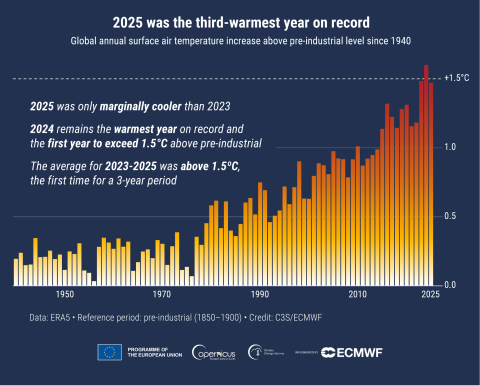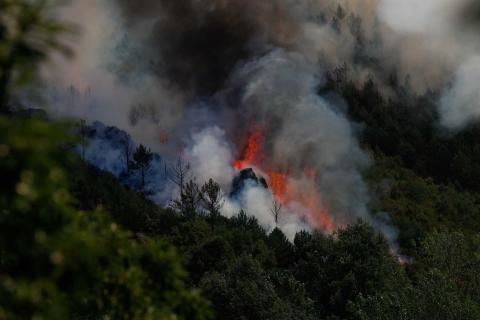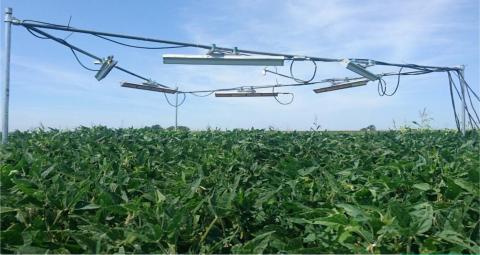University of Lleida
If you are the contact person for this centre and you wish to make any changes, please contact us.
Director of the Energy and Artificial Intelligence Research Group at the University of Lleida
Lecturer of Forestry Engineering and Global Change, University of Lleida

According to data published by the European Centre for Medium-Range Weather Forecasts (ECMWF), which manages the Copernicus Climate Change Service, last year was the third warmest on record. Globally, the last 11 years have been the 11 warmest since records began, and global temperatures for the last three years (2023-2025) have exceeded, on average, 1.5°C above pre-industrial levels (1850-1900). This is the first time a three-year period has surpassed the 1.5°C threshold.

In 2025, climate change drove extreme weather events around the world, disproportionately affecting vulnerable and marginalised communities. In addition, global temperatures were exceptionally high, heatwaves were significantly more intense than 10 years ago, and millions of people were pushed to the limits of their ability to adapt. These are the main conclusions of the 2025 report published by the World Weather Attribution initiative, whose experts believe that ‘drastically reducing fossil fuel emissions remains the key policy for avoiding the worst impacts of climate change’.

Around 5,800 deaths per year in Spain between 2012 and 2021 can be attributed to heat—twice as many as during the 1990s—according to a report published in The Lancet. In addition, of the deaths that occurred during 2022, around 22,000 can be attributed to air pollution, the publication adds. The Countdown report describes the impact of climate change on global health with more than 50 indicators reviewed by scientists. In the period 2020-2024, 61% of Spanish territory experienced at least one month of extreme drought per year; this figure is six times higher than the average for the period 1951-1960.

Between 2019 and 2021, five major fires burned nearly 500,000 hectares in Sierra Nevada (California). Now, a team from the United States has analysed the relationship between the structure and type of ownership of these forests and the development of a severe fire. Their conclusions are that this probability is 45% higher on private land used for the timber industry than in public forests. The results are published in the journal Global Change Biology.

Forests cover approximately 40% of Europe's land area. Between 1990 and 2022, they absorbed around 10% of the continent's emissions from human activity, but this process is slowing down. An international team, including CREAF and CSIC, analyzes this decline and its causes in an article and proposes possible solutions. The work is published in the journal Nature.

The changes caused by the climate crisis—such as its impact on rainfall and rising temperatures—are stressful for plants in both wild and agricultural environments. A special issue of the journal Science brings together five articles reviewing this issue, including the adaptations that plants can adopt and that could be applied to combat it.

An international team has analyzed the sudden changes in temperature that occurred in the world between 1961 and 2023. Their conclusions are that more than 60% of the regions included in the analysis - including Western Europe - have experienced an increase in the frequency and intensity of these sudden changes, which can endanger health, agriculture or infrastructures. Moreover, the trend will continue to rise as a result of climate change. The results are published in the journal Nature Communications.

The year 2024 was the warmest year in Europe, with record temperatures in almost half of the continent, according to the European State of the Climate 2024, published by the Copernicus Climate Change Service (C3S) and the World Meteorological Organization (WMO). The report highlights 2024 as one of the ten wettest years since 1950 and estimates that storms and floods affected 413,000 people in Europe and at least 335 people lost their lives.

A study reveals that most of the carbon dioxide (CO2) absorbed by ecosystems has been stored in dead plant material, soils and sediments, and not in living biomass. These data, which suggest that terrestrial carbon reserves are more resistant and stable than previously believed, are crucial for designing future climate change mitigation strategies and optimising carbon sequestration efforts. The findings are published in the journal Science.

An international team has analysed temperature and mortality data from 854 urban areas in Europe, and estimated that temperature-related deaths could increase by 50 % by the end of the century - which would mean up to 2.3 million more deaths - if no climate change mitigation measures are taken. This percentage is even higher in southern parts of the continent, such as Spain. The results are published in the journal Nature Medicine.